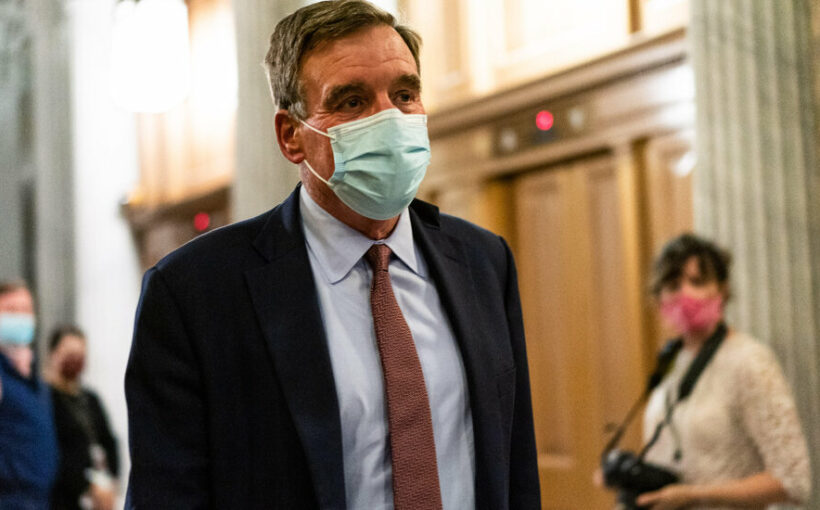WASHINGTON — The Senate Intelligence Committee will examine the influence of Russia and other foreign powers on antigovernment extremist groups like the ones that helped mobilize the deadly attack on the Capitol last month, the panel’s new chairman said in an interview this week.
As the executive branch undertakes a nationwide manhunt to hold members of the mob accountable, Senator Mark Warner, Democrat of Virgina, said it would be vitally important for the influential committee to do a “significant dive” into antigovernment extremism in the United States, the ties those groups have to organizations in Europe and Russia’s amplification of their message.
With the power-sharing agreement between Democrats and Republicans in place, Mr. Warner took over this week as the chairman of the Senate Intelligence Committee, after four years as its vice chairman. In an interview on Wednesday, Mr. Warner outlined his priorities, such as the spread of disinformation, the rise of antigovernment extremist groups, Chinese domination of key technologies, Russia’s widespread hacking of government computer networks and strengthening watchdog protections in the intelligence agencies.
The White House has ordered the Office of the Director of National Intelligence to work with the Department of Homeland Security and the F.B.I. on a new analysis of the threat from domestic extremist groups and the support they receive from foreign powers or overseas organizations.
Those antigovernment extremists include QAnon, the conspiracy movement, and the Proud Boys, a far-right organization that Canada named as a terrorist group on Wednesday. Supporters of those groups and others were part of the attack on the Capitol building on Jan. 6, which aimed to stop the transfer of power to the Biden administration.
The issue is a difficult one for the intelligence community. By law, the most influential agencies, including the C.I.A. and the National Security Agency, are not allowed to collect information domestically. But Avril D. Haines, the director of national intelligence, has some oversight of the intelligence arms of the F.B.I. and the Department of Homeland Security, which can collect information domestically. Other intelligence agencies look at foreign attempts to influence American groups.
While preliminary work by Ms. Haines’s office is underway, administration officials said that analysis was unlikely to be completed before April. But there appears to be significant interest in moving quickly on the issue in the Senate. At Ms. Haines’s confirmation hearing last month, a number of lawmakers raised the subject of domestic extremist groups.
The Senate Intelligence Committee will examine both white supremacist groups on the right, and antifascist, or antifa, groups on the left, though Mr. Warner was quick to say that the danger the groups posed was not the same. “I don’t want to make a false equivalency argument here,” he said, “because the vast preponderance of them are on the right.”
Like the intelligence community, Mr. Warner’s panel could face its own jurisdictional challenges as a handful of other House and Senate groups jockey to play a role in studying the aftermath of the Capitol assault and congressional leaders contemplate setting up an independent commission.
For the past four years, the committee has done extensive work on disinformation efforts. Mr. Warner said that experience could guide the panel as it looks at how extremists groups spread propaganda and how foreign powers amplify it.
Unlike most corners of Capitol Hill, and unlike the House Intelligence Committee, Mr. Warner’s panel has managed to operate, for the most part, with bipartisan agreement. All but one senator on the committee backed its five-volume report on Russian interference. Completed last year, the Senate investigation was perhaps the definitive word on Moscow’s interference efforts and found that Russia had disrupted the 2016 election to help Donald J. Trump become president.
Mr. Warner said on Wednesday that the bipartisan record of the committee was important for him to preserve, and that he intended to begin work with closed-door meetings to make the case to other committee members about the threat the groups represent and how they could be exploited by outside powers.
Democrats and Republicans on the committee have expressed interest in examining antigovernment extremist groups, Mr. Warner said. But he acknowledged the political sensitivities after the Capitol attack and Mr. Trump’s support among far-right factions of those groups. Making the case that antigovernment groups are a problem not only in the United States but also in Europe is one way to build consensus on the issue. The committee, Mr. Warner said, will begin its discussions in private sessions so lawmakers can have a candid and less political conversation.
Beyond an investigation of antigovernment extremism and foreign efforts to promote it, Mr. Warner said the committee would work on pushing for new protections for whistle-blowers and making it more difficult to dismiss inspectors general, government officials charged with finding waste, fraud and abuse.
Capitol Riot Fallout
From Riot to Impeachment
The riot inside the U.S. Capitol on Wednesday, Jan. 6, followed a rally at which President Trump made an inflammatory speech to his supporters, questioning the results of the election. Here’s a look at what happened and the ongoing fallout:
-
- As this video shows, poor planning and a restive crowd encouraged by President Trump set the stage for the riot.
- A two hour period was crucial to turning the rally into the riot.
- Several Trump administration officials, including cabinet members Betsy DeVos and Elaine Chao, announced that they were stepping down as a result of the riot.
- Federal prosecutors have charged more than 70 people, including some who appeared in viral photos and videos of the riot. Officials expect to eventually charge hundreds of others.
- The House voted to impeach the president on charges of “inciting an insurrection” that led to the rampage by his supporters.
Source: Read Full Article
